
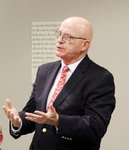
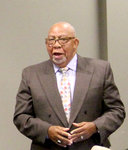

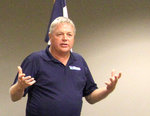
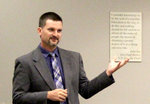
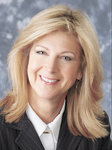

Scott County Supervisor candidates joined more than 50 voters for a Sept. 20 NSP forum. NSP Assistant Editor Mark Ridolfi moderated the forum and presented questions from readers and North Scott High School FFA students.
Candidates were encouraged to be concise, but had no time limits.
The result was more of a conversation than debate. This report is compiled from audio recording and is edited for clarity and brevity. Supervisor candidate Carla Williams was unable to attend, but took the same questions in a separate interview. Her answers are included.
NSP Q&A: Scott County Supervisor candidates, Part 2
Q: Why are you running now?
CROKEN: I actually had intended to do this four years ago, but my wife was diagnosed with breast cancer, and we decided it just wasn’t the right time. Happily, she is well today, and here I am in front of all of you.
KIRK: I believe what prompted me is this thing of service, an opportunity to give back to a community I love so much. All my life has been about service. My mother instilled an ethic of service, and I’ve served in many statewide and community boards. So this was a good opportunity for me to serve.
KINZER: Back in 1996 my father, Ron Kinzer, ran for House District 44. He was a retired iron worker, and I said, ‘Dad, what would you want to do that for?’ And he won and he served very well. In Blue Grass, I served three consecutive four-year terms, then served as mayor for five years.
I want to continue service to the small communities.... the Blue Grasses, Walcotts, Dixons, the Buffalos, need a voice on the Scott County Board.
MAXWELL: I’m a fifth generation Scott County descendant. My great, great grandfather came here in 1855. They’ve been farmers or doctors along the way. My grandfather served as supervisor from the early 1950s to middle 1960s. That kind of got me interested.
I started Cinnamon Ridge farms in 1988. I was turned down by seven banks, and the eighth bank gave me a loan.
In 1997, I started a tour business because I was a nationally outstanding farmer. We see a lot of international tours today, about 6,000-7,000 people on our farm, and I’m very adept at communicating and communicating to the public.
In 2011, I ran for North Scott School Board. There were lots of candidates. I was elected and have been president for four years. We’ve seen a lot of things along the way that will help me with this.
Carole Earnhardt’s decision to not run made me think, hey this is time for me to serve and step up for Scott County citizens.
WEBSTER: Carole Earnhardt and Diane Holst are retiring, and there was a void that needed some experience I believe I have.
Ultimately, I started in public service to better the lives of the children that I have.
I can’t explain how much it means to me they’re actually here tonight. A lot of the stuff we do at the city level rolls right into what we do at the county level. .. .
Ultimately, it's service and trying to leave something better to the family members who go behind me, and continuing to make Scott County moving forward.
WILLIAMS: I think this, more than any other position I could have run for, fits my background. I have 17 years of owning my own business. I also have a mental health background, 23 years, and I know that’s going to be important.
I served on city council, and I worked with Maggie Tinsman, who has been a tremendous mentor for me personally and professionally. All of those things really prepare me to serve.
Q: In the past four years, Scott County has added 8.81 employees and is now up to 486.5 FTEs. Supervisors also authorized a full-time position to help with custodial work with the Scott County Waste Commission. Talk about the employment levels. Too many? Too few?
KIRK: In talking with some of the department heads, I know very recently the board has approved bringing some additional people for the jail … .
In order to say where we are, we need to talk to those individuals who are in those departments and then look at the budget and address those needs.
Being a manager for Federal Express and managing large operations, I’m always concerned about budget. But I’m also concerned about meeting the needs of the people.
Most of what we do is service oriented … In order to do it effectively and efficiently, we need to look at it, and if it needs more FTEs, we need to bring in additional people.
CROKEN: … I absolutely agree with the board when they voted to increase the number of jail guards. But where is the plan to decrease the number of inmates? That’s the other half of the plan. Mental health patients constitute somewhere between 30 to 50 percent, we’re being told, of the jail population.
I’ve been a supporter of the Scott County Mental Health Court …
We need to take a look at not just the size of the workforce, but what is the work that’s being done? Where else could we come to greater efficiencies through regionalism or consolidation? Do we really need separate departments in Davenport and Bettendorf and North Scott County and LeClaire? Are there none of these services we could come together as a region and provide to everyone more efficiently?
Voting is an essential service of the auditor’s office I believe to be understaffed. But again, we need to start not with, ‘Let’s get more employees.’ We need to start with, ‘What’s the job to be accomplished and how do we do that more efficiently without throwing more money and more people on top of the current approach?’
KINZER: I voted for those new positions, except for one. I did not support the custodial staff to go to the Waste Commission.
But I’m very supportive of what we’ve done.
I talked to the sheriff. The jailers are working 12-hour shifts. We’re understaffed.
Look at the miles and miles of secondary roads and bridges we have to maintain … We should listen to you (county department heads) if you say, ‘I need some more help.’ Because if you don’t, it creates an anxiety issue. It creates overtime.
Why don’t we just give them the help they need? We’re not in a budget crunch. Everything we’ve done since I’ve been on this board … has been paid for. All the services, all the consolidation we’ve done has been done through the department heads visiting with staff, the elected officials. And guess what? It’s all paid for.
WEBSTER: When going door to door, it seems as though people don’t understand what the Scott County Board does. I find the same thing happens in Bettendorf. I think it’s because a lot of people are happy with the services they’re getting. There's nothing going wrong for them.
My stepdad is an employee of the county. They need to be well taken care of. It’s the same philosophy I’ve had all the time I’ve been elected.
… Joe Hutter told me when I got into politics – the first race I lost in Bettendorf – he said people will pay taxes as long as they expect a service and as long as that service is given to them in a reasonable fashion.
It doesn’t mean just throw money at it. If problems are out there, we need to solve those problems, and you need to be conservative in nature and not just throw money at it like Washington D.C. does … Listening to your staff members and department heads is the most important part …
WILLIAMS: I really haven’t had any problem with what has been done to this point. I think the board members do their homework. I think they are rational thinkers who have walked through this very well.
I talked to Sheriff Tim Lane. There may be some need there and in our juvenile detention facility, but I don’t know I would necessarily do that right now.
Mental health is evolving right now, so we have to look and see what happens.
MAXWELL: I applaud them for adding staff for this last four years. I think they’ve done a good job. Part of it was they listened to different groups. I think we all agree, you need to let the workers do the work and don’t meddle in their work.
Also, make sure the efficiencies are there.
We actually did that in North Scott. In the last seven years we have fewer administrators and more teachers. …
Question from FFA student Chloe Engelbrecht: In the past decade Scott County has lost more than 10 percent of college-aged students. How can you keep me here as I enter into my college years?
CROKEN: Chloe, there are a number of issues I think are drawing our young people away. The cost of education in Iowa is skyrocketing … Iowa students are graduating with the highest student debt in the nation. It’s not altogether surprising they are looking for opportunities elsewhere.
We need to focus again on job creation …We don’t have the diversity of work opportunities in Iowa that we could and should have. So I think we have to improve education opportunities for all Iowa students. And I think we need to focus on the economic development issues that are driving our young people away.
Today, when you compare Scott County to the other large Iowa counties, we have the highest unemployment, the slowest wage growth and the lowest per capita income.
… Why can’t we create a relationship with Scott Community College to get our students discounted rates? Why can’t we set up internship programs for local businesses to get our young people the experience they need to grow? Why can’t we look for new opportunities for our existing Scott County products?
The price of soybeans has plummeted over the last couple of weeks and months … How do we bump domestic consumption of soybeans? When was the last time you went to a restaurant that wasn’t an Asian restaurant and on the menu was soybeans?
… There’s a whole number of innovative uses that our farmers and our future farmers are depending on to create some creative partnerships now … that result in the big ideas that change things tomorrow and keep our young people home.
KINZER: … I didn’t go to college, but I went to trade school. And I’m blessed being from a family of ironworkers, and I’m blessed to have a son who is a plumber. Right now, work is plentiful in this area for the skilled trades.
Technology is what we need to keep you here.
… Economic development is wonderful, but I’m here to tell you when you hit the corn and beanfields, I’m going to stop that economic development. Yeah, a Democrat said that.
I’m very aware and in touch with farm ground. I didn’t support the industrial floating zone … We want to have you come back and apply your trade. But if we gobble up prime farm ground to put some company on there, then you won’t have any place to apply your trade.
In your instance, I would work to revitalize existing businesses, empty buildings we have here; maybe work with our state legislators on responsible TIF, responsible tax issues that we can make them revitalize, repurpose, but keep that balance. Agriculture has a very specific need in Scott County. I will always fight for that.
WEBSTER: I may be the youngest one here … To keep young people here, this is always talked about. A big part of it is education. The hard part is how does the Scott County Board make Scott Community College give free tuition? You can’t, it’s against state law.
You could partner with those to create solutions, but somebody’s got to pay for it.
I’m a tradesperson also … I’m also state president of Homebuilders Association … Getting a four-year degree is not necessary for everyone. Some people might need a technical degree, or no degree at all.
Nobody wants to go into the trades anymore, but these guys are making $100,000 a year as a plumber.
… Another big thing is making these cities walkable, making these downtowns exciting with something to do. When I was a kid, there was nothing to do …
We need to build the colleges around here. Western Illinois University coming here, that’s big.
When Davenport takes that northern part of its area and gets industrial and high tech jobs … we should rejoice, because they’ll live in Eldridge.
WILLIAMS: I’m not sure. We obviously have to provide opportunities for them. I’m not sure what I would say for how we do that. We need to find motivations to encourage them to come back.
MAXWELL: I never dreamt Ken Croken would talk about soybeans. Thank you, Ken. Good job.
The protection of farm ground is obviously very important to me as well. As a North Scott School Board member through the years, we started a student home-building program and we had only a couple of students. Now we have a whole program.
… What brings people back is that career-readiness to come back and have a job here. Also in that circle is job creation. That means economic development in the right spots. I don’t want it next to my farm. I want it where it belongs. The old Kraft plant downtown or something like that, would be a great spot to have jobs …
KIRK: I had the opportunity several months ago to meet with many students from North Scott at one of the Big Tables. That was a question we talked about.
We do this thing called Quad City First, and the board of supervisors gives to them and to the Quad-City Chamber of Commerce.
… But … Scott County is made up of rural communities. What can we do as a board to keep our young people here? … If you check the census, our townships are declining. That tax base is declining. What do we do?
One thing I propose is to invest in business incubators which would create jobs in these townships and give our young people opportunities to use the trades and other skills to develop those communities, so it would keep them in our community.
Question by FFA student Dylan Engelbrecht: Scott County has made farmland conservation a big deal, but farmland near cities has been gobbled up. Examples include Sterilite, Kraft and Bettplex that cover hundreds of productive acres. Regarding the county’s land use plan, what would you change?
KINZER: When I got on the board, this thing came up about ag-protected ground and the industrial floating zone … I knew it had to do with the big fertilizer plant that was going to come here, then ended up going to Weaver. I did my homework on that, I’ve got a file out in my truck. In that room (for the planning and zoning commission hearing), there were 86 folks: Five for it and 81 against it. I sided with the 81 folks.
Scott County just redid our future land use map. I voted against it … If you look at the future land use map as it is now, you’ll see where there’s ag protected ground created back in 1978, '79, '80. A lot of folks … have given up their sovereignty to protect their farmground … So we’ve got to maintain that border of ag protected ground…
If it’s voluntarily annexed into a city – we just did 400 acres voluntarily annexed into Princeton – there’s nothing the county can do.
... I’m concerned as you are that once land is within certain miles of a city, they can ask for voluntary annexation. Once they do that, all bets are off.
We have to be very in tune, and I am so with agriculture.
WEBSTER: The hard part I have with farmland is it’s a fine line because you’re infringing on landowner rights and their ability to sell their land. You get into a constitutionality issue with this stuff where it gets crazy. Newspapers like to write about it whenever we get close to stepping on anything anywhere close to that … which is great because it gets us thinking about it.
I would hope that most of the time, they are at least located close to a city. The hard part is if you’re one parcel line off of a city, you can’t create an island.
If the county board is going to put an industrial zone in the middle of fertile farmground next to nothing, it will be a hard time getting me to vote for it. It makes no sense.
The idea of having farmground bulldozed by economic development is tough. These things need to stay inside cities.
WILLIAMS: Buffering around those areas is essentially important. Conserving farmland is important, but at the same time, I think if someone wants to develop their own property, there has to be some discussion.
I think annexing would be a better solution than the county taking on responsibility for the roads …
MAXWELL: Obviously, being a farmer, I’m all about farmland preservation. The Sterilite plant was zoned into the city of Davenport. It was planned for many, many years for development.
As far as building out in somewhere where it is in the farming area, I’m totally against it. I do appreciate the strong values from back in the 1970s of let’s preserve it. So let’s start now and be very rigid about it.
I’m all for making sure planning is done in the right spots.
KIRK: I’m from Louisiana. We didn’t have corn, soybeans. We had cotton. I was part of the FFA. When I think about land usage, I agree with Brinson. The simple reason is this. Scott County is a farming community. Whether we accept this or not, we feed a part of our country. So we have to be very concerned about our land usage … If we give all the land away just on the basis of economic development, then where is our future?
CROKEN: … I agree with Mr. Webster. I don’t think it’s appropriate to pass a law saying you can’t sell your land because we think you should be a farmer.
The one thing I don’t agree with is there’s nothing the county can do about it.
If we want to preserve farmland, then again, we need to invest … Why would someone want to sell their land? Because it’s not profitable to work it anymore. So what can the county do? Improve farm-to-market transportation issues. Focus on all the programs that would make farming more profitable, more productive…
I think there’s a great deal the county could do. Where’s the innovation center that will look for how we create new markets for the crops grown here? Transportation issues? The cost of transporting our goods is staggering for some people.
...We need to figure out the missing links that will help them be successful and deliver on that.
Q: What are your thoughts on residential or small business development in the rural county?
WEBSTER: It’s pretty tough. I’ve built homes in Park View, and it’s very tough.
I never understood why Park View didn’t become its own town. In my belief, it’s what they should have done.
...This is the exact problem and reason they have ag preservation. You get these pockets of development out there. Trying to maintain those roads … they have enough to maintain in secondary roads. They’re building themselves a town without the expenses other towns have: maintaining the road, fire districts and so forth.
The idea of putting things on your own farm ground, it becomes an interesting thing. When you’re taking landowners’ rights away and their ability to do those things … the government is taking your ability away …
It really is a case-by-case basis. There are certain uses that could fall into the agriculture category that you’re going to have to let them go. You have to follow the law and the Constitution.
WILLIAMS: I think the smaller development areas like the Park View situation, it makes more sense to annex into larger areas instead.
I’d have to know a little bit more about those businesses. If that’s not consistent with the plan we’ve been using, there has to be more discussion. But the county has a plan they like to stick with, and there would be no reason for me to change that unless someone had a good argument.
MAXWELL: I went to the planning and zoning commission meeting Monday, and they addressed that very issue (of maintaining rural subdivision roads.) It is not unheard of that in the past, they have done that also. They’ve had it where they didn’t plow the streets. It kind of has gone both ways throughout. As a board member, I would rely on the planning and zoning commission to have done the homework and to talk about those things … and bring me the right information.
As far as wanting a wedding reception hall out in the country, I think planning and zoning recommended it not happening. It didn’t fit the county’s vision. (Scott County Planning director) Tim Huey does a fine job when I go to a lot of these meetings. He presents the county board with all the details.
KIRK: The question is what precedence has been set? When you look at it, really no precedent has been set. They have done it for some, but have not done it for others. Now is a very good time for them to come back together and begin to set precedence of what they will do or not do.
It seems unfair to someone because now you’ve done it for someone else.
We need to begin to say, this is where the board stands, and not be so arbitrary about when we do it.
CROKEN: I agree with an awful lot that has been said so far. But, one more time, what problem is it we’re trying to solve with this issue? As I see it, the problem is it’s inherently unfair to ask the people of Eldridge to pay for maintenance of streets in Park View. I get that … Why can’t we create a process that says, ‘Look, when you get to this many number of roads, this many number of residents, then incorporate.’ At some point, you are your own town and you have to pay your own bills and not ask your neighbors.
It is extremely advantageous today in Scott County to live in unincorporated parts of the county … There’s a limit to the density of the population and amount of the expense. We need to identify that, and as we make our deals, we need to be clear going forward that, yes, we will do this. But now you’ve reached the limit where anything beyond this, you incorporate first.
KINZER: … I believe the county has not accepted a new road since 2007 or 2008. When I first got on the board, a dear friend of mine lived in Village Oaks. He said, 'I’m going to vote for you because I want you to take over my roads.' And I said, 'Then don’t vote for me.'
The minute that you do, we are going to hear from Village Oaks, from Hickory Hills, from all the other additions, Timber Lakes, everywhere, waiting for those plows and maintainers to come through.
It’s consistency. The county has been consistent.
The Valley View addition developers knew that very clearly early last year that the county wasn’t going to accept those roads.
Recommendation was by the Secondary Roads department and supported by the board. We just don’t have enough staff and equipment to take this on.
And I support secondary roads.
Q: What elements of your party label will be evident in your service? How will voters know that you’re a Republican or Democrat?
MAXWELL: I think my Republican-ness goes all the way back to my grandfather, who served the county as a Republican supervisor.
I think you’ll see the Republican in me with my conservative values, especially my fiscal conservativeness, and making sure the budget is right, though it's not that Democrats don’t.
…We know people who would be in Des Moines or Washington D.C. We could communicate with those folks because we have aligned with them. I’m saying it’s not that you don’t align with the other party, but you tend to talk with the ones of your party more. As an example, I would talk to state Sen. Roby Smith perhaps more than someone else because we’ve talked a lot in the past, and we happen to have similar values in some ways.
As for the county board, I think there’s very little partisanship. We all want to have a balanced budget. We want to fund mental health as much as we can.
KIRK: They probably won’t see it. I hope what they will see is me showing forth my faith and who I am, working together with people to achieve a common objective.
I am fiscally conservative. I’m socially liberal. But I believe that working together we go together as a team, supporting what we all agree on. I hope what comes forward is not that you see a Democrat or Republican. I hope you see a man who stands for truth, righteousness and wants the best for Scott County.
CROKEN: … I’m a dyed-in-the-wool Democrat … But I, too, would like to think county business can be conducted in a non-partisan way most of the time. … I don’t know it’s about party, but it’s about values … When you look at our peer group of counties, we have the highest rate of poverty in Iowa. We’ve got to do something about that. We can’t let people live in poverty. We have to take action.
But I will also assure you that as vocal a critic as I have been of the Republican-controlled statehouse, I will be equally concerned if I see a Democratic General Assembly going in the wrong direction.
We have seen the Des Moines politicians weigh in on issues they’ve got absolutely no business on — How we elect our supervisors. Banning public labor agreements. All of these decisions can be made in Scott County, not in Polk County. So to that extent, I suppose I’m somewhat Republican in my commitment to local control.
KINZER: I’m a Democrat. I’m a proud Democrat, and I come from a long line of Democrats. I’m a labor person.
… I became an IBEW Local 145 electrician, and I believe I have the best training in the world through that four-year apprencticeship. My son is an apprentice with Local 25 plumbers and pipefitters. We are very union-oriented.
So the distinction you’ll have with me, is I will fight for collective bargaining rights for the men and women who work at Scott County. ...I’m a safety director for my company. I believe in OSHA. I know that’s a bad word for some folks.
… Mother Jones had a saying: ‘Mourn for the dead and fight like hell for the living.’ And that’s what I’ll do.
On the other side, I’m a Scott County resident. I’m going to fight for you. We have a balanced budget, and I’ve been blessed to sit with some great folks on that board. We’ve checked our egos at the door.
WEBSTER: I grew up in a Democratic family. My dad and stepmom, my mom and stepdad, they produced a Republican, and we can’t quite figure this one out yet.
I’m conservative in how I do budgets. If we have a budget shortfall, we figure out, not how to limit services, but reduce expenses. Does that make me a Republican? If it does, then I say I am.
… I don’t take money from one group and give it to another. If that makes me a Republican, I’m a Republican.
… I’m not going to disparage the other side. There are conservative Democrats. There are Democrats on the Bettendorf City Council we deal with. I didn’t know they were Democrats for two years.
My biggest accomplishment is I now have four parents who are all Republicans.
WILLIAMS: I’m probably more conservative in my thinking. I’m sure that would show in my values. Not to say I wouldn’t bridge across the aisle. I think that’s important, too.